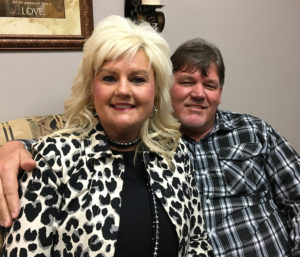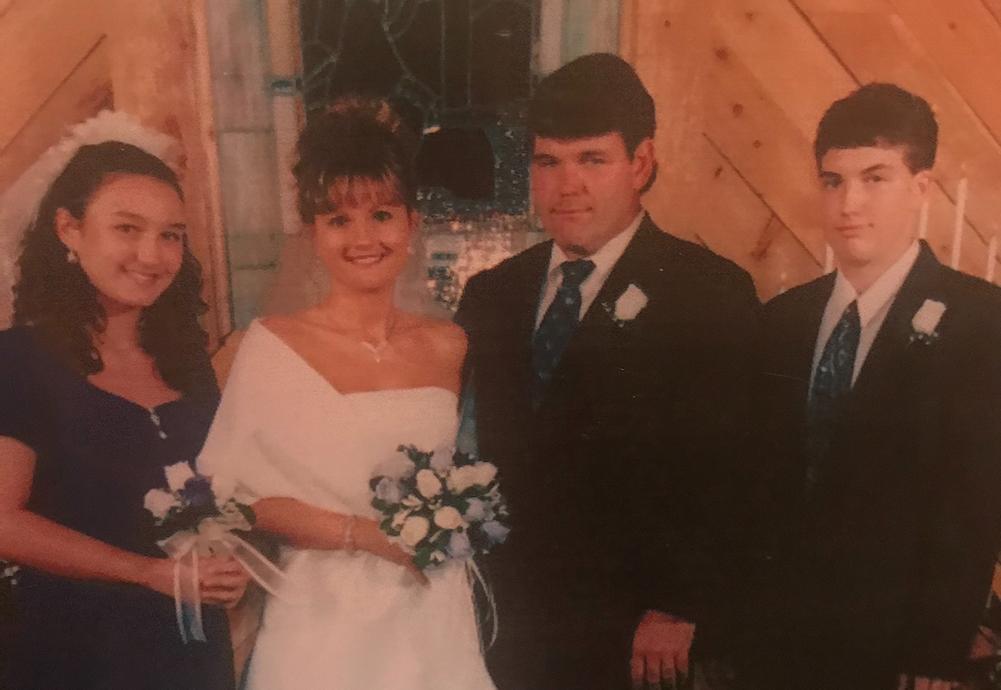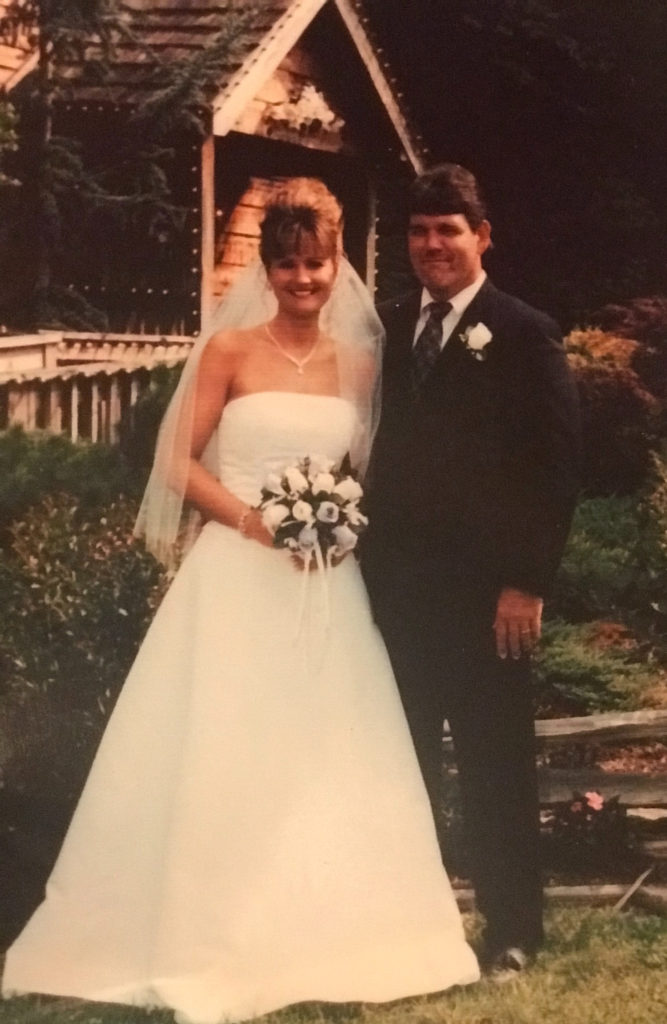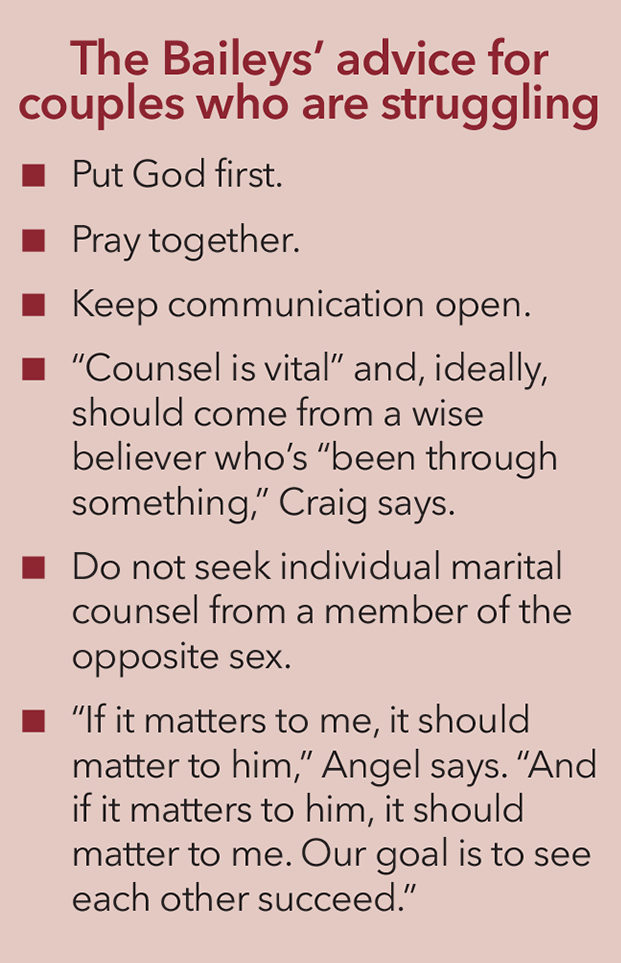By KATIE EUBANKS

Angel and Craig Bailey in Craig’s office at New Life Christian Fellowship in Pearl.
Angel and Craig Bailey
How God resurrected their marriage
They were “riding the block” in Magee, Mississippi. She was from Mendenhall; he was from Raleigh.
He was driving a red 1986 IROC Chevy Z-28, the first one in town. She was riding with a friend in a parent’s car.
And when Angel Smith saw Craig Bailey for the first time on February 28, 1986, she thought, “I don’t know how … but he’s going to be mine.”
In less than two years, they were married. They soon had two children, and Craig followed a call to preach at Sumrall Holiness Church, later renamed Christian Praise and Worship, in Simpson County. Angel sang special songs with Craig’s brothers on Sundays.
Craig prioritized the church ahead of his family. He thought that was putting God first.
“That’s the erosion of the marriage,” he says now. “If you can’t minister to your family, you can’t minister to anyone else’s family.”
But Angel, too, assumed Craig was doing the right thing. Neither of them had been taught to invest in marriage over ministry.
They also didn’t communicate on a deep level.
“I would try to talk to him (about a problem), and he’d say, ‘Just pray about it,’” Angel recalls.
“It was like a pressure cooker,” Craig says.
‘It was just an emptiness’
In 2001, after 13 years of marriage and a few separations, the Baileys were headed for divorce.
“I felt like it wasn’t affecting him,” Angel says — because Craig kept pastoring. He says he thought that was his calling.

Angel had to borrow a friend’s dress for her first wedding to Craig in 1988.
“But (when you’re getting a divorce) there are certain things you can’t preach on,” he says. “You can’t preach on unconditional love. You can’t preach on forgiveness if you can’t forgive your own spouse.
“(I get) a call from a man whose wife has left him, and he needs prayer. I was encouraging him that God would restore his marriage. And I thought, ‘God, You sure have a sense of humor.’” (Yes, the man knew Craig’s marriage was ending!)
The Baileys didn’t have anyone to talk to about their own marital problems.
“People didn’t talk to each other (about those kinds of things),” Craig says.
Meanwhile, “I was depressed, but I was still wearing a smile, and singing (at church),” Angel recalls. In fact, she didn’t realize just how depressed she was. People didn’t talk about mental health back then, either.
On December 10, 2001, the judge asked them, “Do you want this divorce?” They said yes. Signed the papers.
And then went to lunch at Ward’s in Raleigh, Mississippi. Together. With a couple of folks from church.
“I felt like I was divorcing my best friend,” Craig says.
“We were not bitter,” Angel says. “We were never ugly in front of the kids. We were never disrespectful.”
Angel moved to Foley, Alabama, with their daughter, Kayla, who was 11. Their son, Jonathan, 13, stayed in Raleigh with Craig, who moved in with his parents.
Craig and Angel talked on the phone regularly. On weekends, they would meet halfway to get the kids together.
“It makes me emotional now because of the hurt of not being with my son, and not having Kayla and Jonathan together. It was just an emptiness,” Angel says.
‘I’m marrying your momma today’
A few months later, Angel told Craig she wanted to move back into their house, which was unoccupied. So she and Kayla moved back to Raleigh, and Jonathan moved in with them. Craig stayed with his mom and dad.
Now, sitting on a couch with Angel for this interview, Craig recalls how they each grew spiritually while divorced.
“You were reading your Bible,” he says to her. “You were fasting. You were praying.”
One of the things he had to do was turn Angel over to God, he says.
“I thought if I wasn’t in the picture, she wasn’t going to make it,” he says. “God began to tell me He could talk to her while she was in Alabama, California, Mexico … while she was not with me.
“And then when I was by myself, God was working on me.”
He still thought his biggest responsibility was to keep Sumrall Holiness Church going. “I didn’t understand (that) it wasn’t my church. It’s God’s church,” he says. “God’s going to take care of God’s woman (His bride, the church). I’ve got to take care of mine.”
“We continued to go to (Sumrall Holiness after moving back),” Angel says. “One of my prayers was this: God, if you’ll put my family back together, I’ll serve You all the days of my life.”
In summer 2002, barely half a year after the divorce, Angel told Craig she wanted to marry him again.
“I felt it was different this time around,” she says. “I felt the timing was good. I felt more at peace.”
“I kind of paused,” Craig says, “because, in my mind, she had to make some changes. And in her mind, I had to make some changes. We both had to make some changes, and make sure we weren’t going to end up in that same place again. And in that pause, God spoke to me, and said, ‘Can’t you see the changes I’ve (already) made in her life?’”
Craig wanted to start their new marriage fresh, not in Raleigh. So they kept their plans a secret and took the kids to Gatlinburg, Tennessee, one of the family’s favorite vacation spots.
They secured a wedding chapel. They also invited two friends on the trip but didn’t tell them what was up. Angel brought all the family’s wedding clothes in a garment bag. Neither Jonathan nor Kayla bothered unzipping it.
And on July 1, 2002, Craig woke the kids at the Smoky Mountain Lodge Resort in Pigeon Forge and said, “I’m marrying your momma today.”
Kayla was Angel’s maid of honor, and Jonathan was Craig’s best man. Kayla cried.

On July 1, 2002, Craig woke the kids up and said, “I’m marrying your momma today.” Daughter Kayla and son Jonathan, far left and far right, served as maid of honor and best man.
‘My family’s dying’
The second wedding wasn’t the end of Angel and Craig’s difficulties. Angel still struggled with depression, mostly brought on by childhood trauma.
“I didn’t know how to deal with it, so I kept it suppressed. We didn’t talk about it,” she says.
In 2012, she’d had her colon removed and was in a lot of pain, in addition to feeling her emotional wounds. One night, she took a whole bottle of pills.
“Having to process what happened to me as a child, plus physical pain … I didn’t want to do it anymore. I thought (my family would) be better off without me.”
Craig got up the next morning for work and assumed she was only asleep.
Not exactly — but she did wake up later that morning. When Craig got home, he saw the empty bottle that had been full the night before.
For a few days, Angel was in a fog, and neither Craig nor Kayla would leave her.
“I told her she was not going to die,” he recalls. “Not on my watch.”
Craig’s priorities started shifting.
“Once again, you think, ‘Am I letting God down if I (take a break from ministry)?’ But my family’s dying,” he says.
“I got to the place where I was ready to quit the church and take care of my family. It was a country church, no elaborate salary or anything, so I had to work (another job anyway). I was in construction, built steel buildings.”
Craig attempted to resign from the church twice, but they didn’t want him to go.
“I felt like God was telling him, ‘Hold on, I’ve got something for you,’” Angel says.
Around that same time, the family started helping pastor Danny Sims, of New Life Christian Fellowship in Pearl, who’d become ill.
New Life was wonderful, Angel says, but she felt neglected as Craig did double duty at the two churches.
“I felt like I was spiritually dying. I just didn’t see any hope,” she says. “(And) I felt like Craig was going and doing everything for everybody else when I needed him the most. (But) he didn’t just up and leave (our) church. That’s not who he is.”
In December 2012, Pastor Danny died.

The Baileys’ second wedding took place at a chapel in Gatlinburg, Tennessee, one of their favorite vacation spots.
‘Do it afraid’
In 2013, the Baileys’ lives started to change.
Craig took the helm at New Life in January. Later that year, he handed the home church — by then renamed Christian Praise and Worship — over to Jonathan and a cousin.
That same year, Angel could finally tell a difference in her husband.
“I felt like we were more on the same team. We were there to support one another,” she says. “And I could voice my opinion, and it mattered.”
Also in 2013, in the midst of her own healing, Angel founded New Life’s annual Fearless Women’s Conference.
“I lived in fear through most of my childhood, and it affected me even into adulthood,” she says. “I had to go through a process of forgiving things and talking about it.”
Angel established the conference in order to use her experiences to help others — and to face her own fears, she says.
“You may feel fear, but do it afraid. Even if your hand’s shaking.”
‘We’re not where we were’
Today the Baileys have found a better way of living, both individually and as a couple.
“He’s more caring (now),” Angel says of Craig, still the pastor at New Life. “He’s more aware of what’s going on with me. He cares.”
In addition to leading worship at New Life, Angel continues to have input, from Sunday school to children’s church, Craig says. “She’s all up in it.”
Every Monday morning, Angel sends an encouraging text message to a hundred people individually, including this writer. It’s just one message that she copies and pastes, but it takes time.
“Monday mornings were really hard for me (when I was badly depressed). We’d have good services, and Monday mornings I would find myself crying. (I thought) ‘If I’m going through this, I know other people are,’” she recalls.
She also posts her weekly messages on Facebook — where, Craig says, she encourages people daily.
Meanwhile, Craig is writing a book about “gaining the church and losing your family.” Both he and Angel want others to learn from their experiences.
“We still don’t have it all together,” he says. “We’re just not where we were. And we have the assurance from God that He’s in it.”
